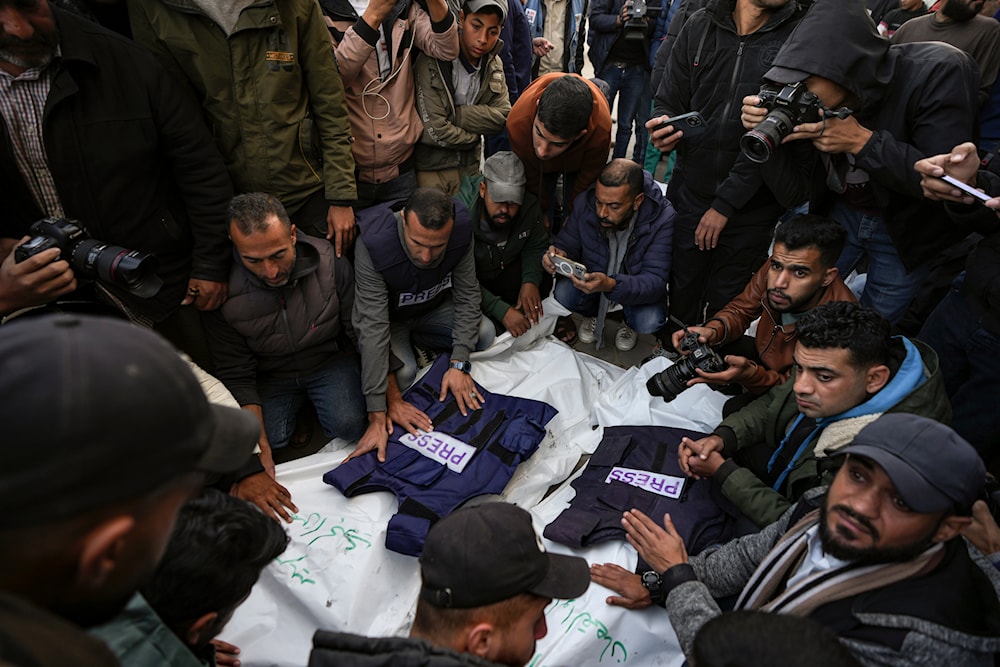On World Press Freedom Day, UN mourns 200+ journalists killed in Gaza
With 211 journalists killed and 49 detained, the UN condemns escalating violations against Palestinian media in Gaza and the West Bank under Israeli occupation.
-

Palestinians, mostly journalists, gather around the bodies of five Palestinian journalists who were killed by an Israeli airstrike in Gaza City, at the Al-Aqsa Hospital in Deir al-Balah, Thursday, Dec. 26, 2024 (AP)
As the global community marks World Press Freedom Day, the United Nations Human Rights Office in the occupied Palestinian territory (OHCHR) expressed urgent concerns regarding the rising number of Palestinian journalist fatalities.
In a statement, the office confirmed the killing of 211 journalists in Gaza since October 7, 2023, including 28 women journalists, while UNESCO reported that at least 47 journalists have been killed while on duty.
Additionally, the latest figures from Palestinian authorities reveal that 49 journalists remain incarcerated in Israeli detention centers as of Tuesday, highlighting the severe risks faced by media workers in the region.
Press vests draw fire rather than prevent it
A journalist informed the UN office that protective press vests, originally intended as safety gear, have now become markers that draw fire rather than prevent it, emphasizing what the agency referred to as compelling evidence suggesting Israeli military operations may have intentionally singled out journalists, which, if verified, would amount to war crimes.
Journalists held in Israeli custody have informed the UN Human Rights Office that they faced physical assaults, degrading treatment, and sexual and gender-based violence while being questioned about their reporting, a systematic pattern of mistreatment that the UN describes as consistent with broader efforts to intimidate and discredit Palestinian media.
Media silencing escalates in Gaza, West Bank
The UN criticized "Israel's" ongoing ban on foreign journalists entering Gaza since the start of the war, permitting only tightly controlled, military-escorted access.
The agency stated that this policy has forced Palestinian journalists to document events under fire while enduring the same violence they are reporting on, leaving them as the sole witnesses to the crisis.
“Their lives and work are under constant threat,” the United Nations said, adding that “they are balancing fear for their families' survival with the responsibility to document crimes against their people.”
Journalists' situation in West Bank not better
Across the occupied West Bank, encompassing occupied al-Quds, Palestinian journalists persistently endure intimidation, arbitrary arrests, and physical aggression.
The UN has confirmed multiple instances of unjustified detentions, especially in high-tension areas such as the Jenin refugee camp and other conflict hotspots.
Palestinian and Israeli security forces alike have imposed severe limitations on journalists attempting to cover events in these regions, frequently resorting to intimidation tactics, unlawful detention, and in extreme cases, the unjustified application of violent measures.
Systematic repression
Amid heightened tensions during a prolonged six-week security crackdown in Jenin that drew significant media scrutiny, Palestinian officials imposed restrictions in January 2025, prohibiting multiple news organizations from operating, justifying the move by accusing them of spreading inflammatory content and false narratives.
The UN stressed that such systematic repression and attacks not only breach fundamental principles of international humanitarian and human rights law but also create significant barriers to ensuring proper scrutiny and justice for continuing abuses across the occupied Palestinian territory.
“The killing, detention, and harassment of journalists must end immediately,” the international bloc stated, calling for holding perpetrators accountable for their actions, "including by third-state parties."
“In times of conflict, the media plays a vital role in exposing abuses and ensuring justice. Efforts to silence them are deeply disturbing and must not be tolerated by the international community," the office concluded.

 3 Min Read
3 Min Read








